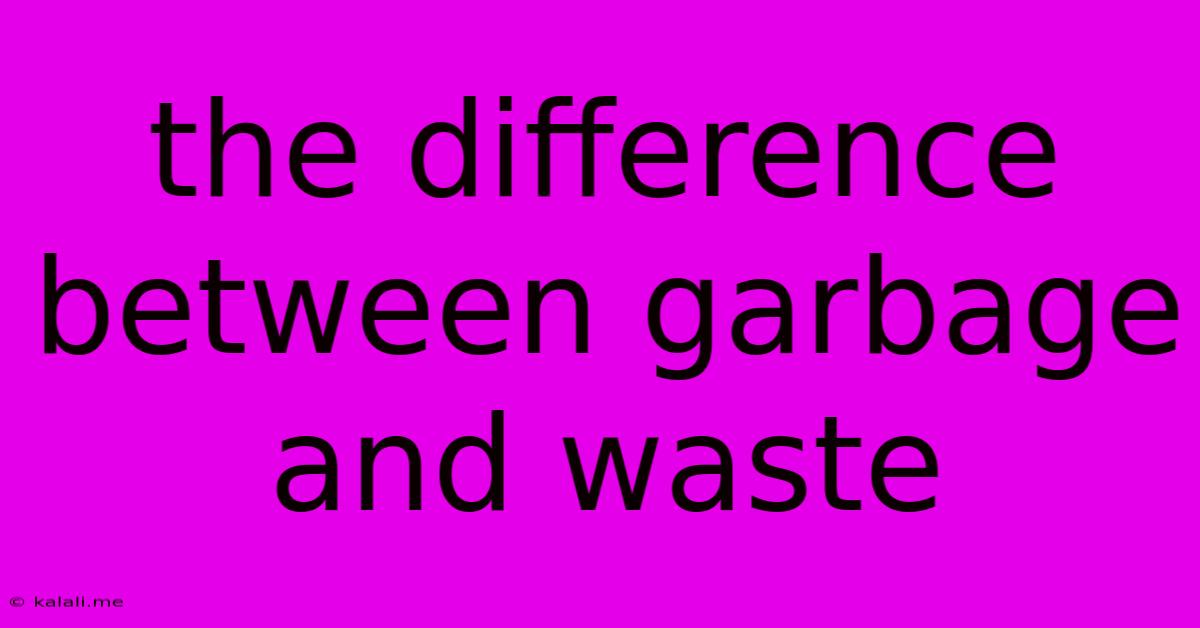The Difference Between Garbage And Waste
Kalali
May 23, 2025 · 3 min read

Table of Contents
The Difference Between Garbage and Waste: A Comprehensive Guide
While the terms "garbage" and "waste" are often used interchangeably, there's a subtle yet important distinction between them. Understanding this difference is crucial for effective waste management and promoting a more sustainable lifestyle. This article will delve into the nuances of each term, exploring their definitions, characteristics, and implications for environmental responsibility. This guide will help you better understand the waste hierarchy and how to properly manage your own waste disposal.
What is Waste?
Waste encompasses any unwanted or unusable materials resulting from human activities. This broad definition includes a wide range of items, from discarded food scraps and packaging to industrial byproducts and hazardous materials. The key characteristic of waste is its lack of immediate value or usefulness to the generator. Waste can be further categorized into several types, including:
- Municipal Solid Waste (MSW): This comprises everyday trash from households, businesses, and institutions. It's the most common type of waste and typically includes paper, plastics, food scraps, yard waste, and textiles.
- Industrial Waste: Generated by manufacturing processes, this category often includes hazardous materials like chemicals and heavy metals, requiring specialized disposal methods.
- Hazardous Waste: This poses significant threats to human health and the environment due to its toxicity, flammability, or reactivity. Examples include batteries, pesticides, and certain medical waste.
- Medical Waste: This category includes materials from healthcare facilities, such as contaminated needles, blood products, and body parts, demanding careful handling and disposal to prevent disease transmission.
- E-waste: Electronic waste, encompassing discarded computers, phones, and other electronics, contains valuable materials and hazardous substances, necessitating responsible recycling.
- Construction and Demolition Waste: This consists of materials from construction sites, including concrete, wood, and metal, much of which can be recycled or reused.
What is Garbage?
Garbage is a subset of waste. It specifically refers to the putrescible organic matter found in MSW. This includes food scraps, spoiled produce, and other decaying materials that attract pests and decompose rapidly, producing unpleasant odors and potentially harmful gases. Garbage is essentially the readily decomposable fraction of your household waste. Think of it as the smelly stuff that needs immediate removal. It is often the portion of your trash that is considered the most problematic from a sanitation perspective.
Key Differences Summarized:
| Feature | Waste | Garbage |
|---|---|---|
| Definition | Unwanted or unusable materials | Putrescible organic matter in MSW |
| Scope | Broad, encompassing many material types | Narrow, specific type of waste |
| Decomposition | Varies greatly depending on material type | Rapid decomposition, often smelly |
| Environmental Impact | Varies greatly depending on material type | Significant potential for odor and pest problems |
| Management | Diverse methods, including recycling, landfill, incineration | Often requires separate collection and composting or landfill disposal |
Implications for Waste Management:
Understanding the distinction between waste and garbage is vital for implementing effective waste management strategies. Focusing solely on garbage collection neglects the broader issue of managing various waste streams, including recyclable materials, hazardous waste, and e-waste. Effective waste management systems prioritize the waste hierarchy: reduce, reuse, recycle, recover, and dispose.
By understanding the differences between waste and garbage, you can make informed decisions about reducing your environmental impact. Composting your garbage is an excellent example of minimizing landfill waste and creating nutrient-rich soil. Properly sorting your waste for recycling helps conserve resources and reduce pollution. Ultimately, a holistic approach to waste management, considering all types of waste rather than just garbage, is crucial for achieving a cleaner and more sustainable future.
Latest Posts
Latest Posts
-
Asymptotic Distribution Of Likelihood Ratio Test Statistic
May 23, 2025
-
You Re Gonna Receive Or To Receive
May 23, 2025
-
Where Do You Find Dragons In Skyrim
May 23, 2025
-
How To Create An Empty Line In Latex
May 23, 2025
-
Hwo To Get Horizontal Line Over Variables Latex
May 23, 2025
Related Post
Thank you for visiting our website which covers about The Difference Between Garbage And Waste . We hope the information provided has been useful to you. Feel free to contact us if you have any questions or need further assistance. See you next time and don't miss to bookmark.